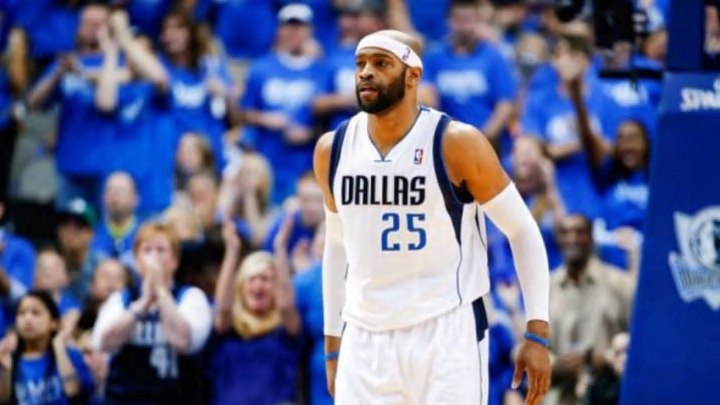
Vince Carter
Carter was the only addition in an otherwise quiet free agency for the Grizzlies, as they needed to fill the void left by Mike Miller’s departure. Carter has slowly transformed his role, going from superstar to settling in as a role player.
He averaged 11.9 points, 3.5 rebounds and 2.6 assists last season.
Strengths: Playmaking, 3-point range
Carter featured mostly as a sixth man for the Mavericks last season, playing as the playmaker off the bench when the starters rested. His usage rate was still 23.1 percent, despite his career low of 24.4 minutes per game. He kept the offense ticking, relying on his playmaking ability to create shots for teammates (where he was responsible for 23 percent of assists whilst on the court) and for himself (79.3 percent of his 2-point field goals were unassisted).
Carter has added the 3-point range to his offensive arsenal since his athleticism started declining. He shot 39.4 percent from behind the arc last season – a rate that would be second on the Grizzlies’ roster last season, behind none other than Mike Miller.
Carter may not be as deadly a 3-point threat as Miller, but he can still provide floor spacing options and is more of a playmaker than Miller was.
Weaknesses: Defense, Age
The Grizzlies’ seem to have a fondness for aging swingmen. Carter is 37 heading into the 2014-15 season, and will be 40 when his deal expires. Age is definitely an issue for Carter, as one wonders how much more his body can take before it starts breaking down. So far, his body has held up, playing almost a full season each year with no major injuries to speak of.
Aside from a minutes’ standpoint, there is the question of how Carter can continue to provide on the court. He only had three games where he played more than 30 minutes, and scored in single digits 30 times last season.
Finally, there are still questions surrounding his focus on defense. Carter has improved on the defensive end, but improvement is only a comparison with past results. Carter’s defense, while improved, is still lagging behind the Grizzlies’ standard. He will need to show more intensity and effort on the defensive end if he is to earn more minutes.
Role and Expectations
Carter is no longer the “Half Man, Half Amazing” player that he once was. He has lost a step athletically and his highlight plays are declining by the season. After a few rocky seasons, he has made the transition to role player and blossomed under the role.
The Grizzlies will be looking at Carter for his playmaking skills when the starters rest, and will probably be the first name off the bench for the Grizzlies. He will also finish the games with the starters and can help spread the floor with his 3-point shooting ability. If Carter can improve his defense or if his deficiencies do not prove to be a liability, he may take over the starting role from Prince.
The front office might come to regret the decision to sign Carter to a three-year deal, but chances were that he would not have joined if the contract duration was any shorter. The Grizzlies recognized a need once Miller left and their replacement should fit in quite nicely.
